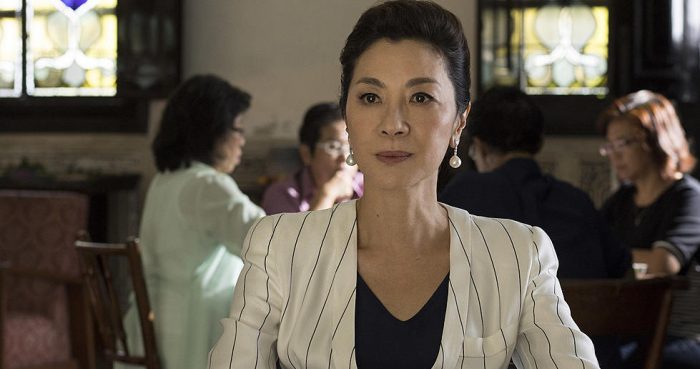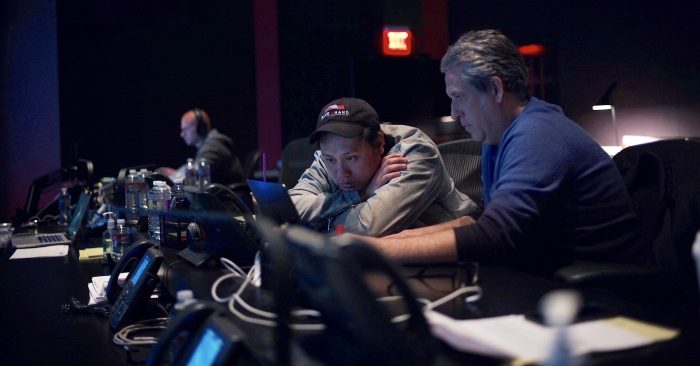
Myron Kerstein wants audiences to know that romantic-comedies are back. The editor of Crazy Rich Asians is no stranger to the genre, having cut together rom-com staples like Garden State and Nick and Norah’s Infinite Playlist, but in the aftermath of Crazy Rich Asians, it feels more important than ever for Kerstein to reiterate that.
Kerstein sat down with /Film to talk about the outrageous success and cultural impact of the first major Hollywood film led by an all-Asian cast in 25 years. Aside from being a watershed moment for Asian-Americans, Kerstein sees Crazy Rich Asians as an opportunity for Hollywood to turn a new leaf for not just representation, but the rom-com in general.
“I just hope people go see romantic-comedies,” Kerstein said. “And hopefully they’ll embrace races that haven’t been there on the screen too much that have basically been there all along.”
“I think this is just the tip of the iceberg,” he added, “and hopefully Hollywood’s gotten the message.”

What was your reaction to the major box office success and pop culture impact of Crazy Rich Asians?
It’s pretty overwhelming, right? Who would think that anyone would ever see your movie alone, let alone a crossover hit. You just never expect anyone would see any of your movies when you’re making them. And then to have such a — you’re hoping that at least an audience would go see your film, but to have it cross over and then have so many people deeply affected by it, is what you hope for in everything that you make. But it was pretty remarkable.
I went to go see the film — it actually came out on my birthday. It was so strange because the film was supposed to be released two days later but then they decided to move it up to a Wednesday, which was my birthday. So I went to go see it with my friends but I ended up sitting alone next to this little boy and his mom, and they were both Asian. And throughout the course of the film, the little boy giggled and weeped throughout the movie and I thought, wow this is a pretty amazing experience right here. To have this affect anyone who might have otherwise never seen something like this represented to them. And if that doesn’t encapsulate the feeling of what this film means to so many people, I don’t know what does.
Yeah I know I cried when I went to see it with my family. And I was surprised that my uncle was crying during several of the scenes during Crazy Rich Asians. So were you aware of that importance of the film going into it when you went to work on the project?
I knew the stakes were high, and that the representation of this community hadn’t happened in 25 years in a major Hollywood movie but I didn’t know it was going to affect people so deeply. I knew that the script felt very important to me, because there were scenes that I related to and I’m not Asian [laughs]. But I knew that the themes were very universal and just to see that the reaction would be so widespread was pretty satisfying. Again, you just never know once you start going into these things how they’re going to turn out.
You have a hunch that the mahjong scene might be deeply felt, or the scene with Rachel and her mom might be deeply felt, but you don’t really know until you start screening it and you’re like “Okay, yeah I guess what I experienced is what everyone else is feeling as well.”
Let’s talk about that mahjong scene. Jon Chu has described the mahjong scene as a “ballet” and choreographed as a fight sequence like something out of Michelle Yeoh’s own movie Crouching Tiger, Hidden Dragon. How did the editing help transform a tabletop game into something that dynamic?
It’s funny, I’ve heard Jon say that as well about choreographing that scene to me and to others, but he didn’t tell me at all how he wanted that scene to be constructed. I think he had the confidence in what he had planned, that I’ll figure it out while I edit, but he also wanted to see my take on it. I also did not know at all how to play mahjong. [Laughs.] When they were shooting B-roll for it, I heard Michelle and Jon talking over the shots — they often record sound when they’re shooting B-roll — and eventually described “this piece as to go there, this piece has to go here,” and I slowly learned how to understand how the game is supposed to be play. And of course I’m not going to have Jon or Michelle Yeoh narrate the scene so I had to find a way to tell the same visual story with the pieces and using all the rules of this game without understanding what was going on. You just needed to understand that this piece represented Nick, and that she was going to sacrifice Nick because she has her own pride…
Keep her own dignity?
Yeah, her own dignity. And I think as far as the other kernels of the scene, I think
Constance did this wonderful job with her performance in this scene. Sometimes you find little kernels of things to build a scene out of, and there’s this wonderful line that I think really encapsulates everything about the scene, where she goes, “I’m not leaving because I’m scared or because I think I’m not enough. It’s because maybe for the first time in my life I know I am.” To me that was the whole scene right there, I just needed to built tit-for-tat as Eleanor and Rachel [confronted each other]. And that being sort of our climax, ended up making the scene.
I know that Michelle Yeoh and Constance Wu both had a lot of input into this scene, did that affect how you edited the scene at all?
Again, I didn’t know any of this! [Laughs] I just knew that the scene found its way to me over many revisions in the script. And I could tell something was going on, they kept rewriting the scene over the course of the shoot. But no one was telling me that Michelle has some notes or Constance has notes, I just see the revisions coming in, but you can see a more deeply evolved script over the course of time where both [Eleanor and Rachel] are basically trying to say what’s important to them and why they’re doing things they way they’re doing them. Sometimes you read a script, you’re like, “Okay it doesn’t matter what these lines are according to the actors or to the characters, and I can cut x,y, and z out of it.” But this was a scene where I don’t think I cut a single line, I think it’s beautifully written.
Continue Reading Crazy Rich Asians Editor Interview >>
The post ‘Crazy Rich Asians’ Editor Myron Kerstein on the Universal Messages of Rom-Coms and Mahjong [Interview] appeared first on /Film.
from /Film https://ift.tt/2PoIffw

0 Comments